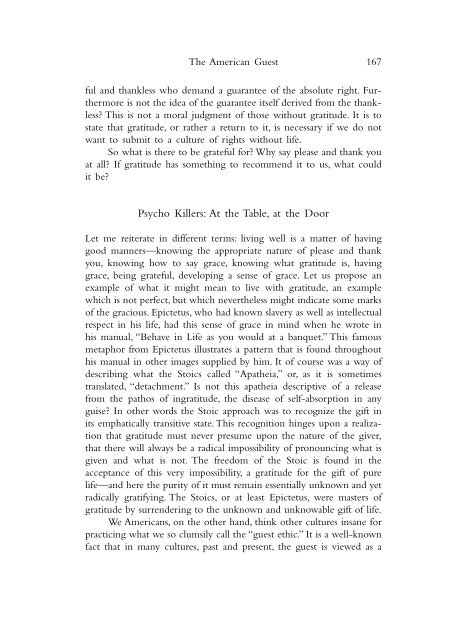You also want an ePaper? Increase the reach of your titles
YUMPU automatically turns print PDFs into web optimized ePapers that Google loves.
The <strong>American</strong> Guest<br />
167<br />
ful and thankless who demand a guarantee <strong>of</strong> <strong>the</strong> absolute right. Fur<strong>the</strong>rmore<br />
is not <strong>the</strong> idea <strong>of</strong> <strong>the</strong> guarantee itself derived from <strong>the</strong> thankless?<br />
This is not a moral judgment <strong>of</strong> those without gratitude. It is to<br />
state that gratitude, or ra<strong>the</strong>r a return to it, is necessary if we do not<br />
want to submit to a culture <strong>of</strong> rights without life.<br />
So what is <strong>the</strong>re to be grateful for? Why say please and thank you<br />
at all? If gratitude has something to recommend it to us, what could<br />
it be?<br />
Psycho Killers: At <strong>the</strong> Table, at <strong>the</strong> Door<br />
Let me reiterate in different terms: living well is a matter <strong>of</strong> having<br />
good manners—knowing <strong>the</strong> appropriate nature <strong>of</strong> please and thank<br />
you, knowing how to say grace, knowing what gratitude is, having<br />
grace, being grateful, developing a sense <strong>of</strong> grace. Let us propose an<br />
example <strong>of</strong> what it might mean to live with gratitude, an example<br />
which is not perfect, but which never<strong>the</strong>less might indicate some marks<br />
<strong>of</strong> <strong>the</strong> gracious. Epictetus, who had known slavery as well as intellectual<br />
respect in his life, had this sense <strong>of</strong> grace in mind when he wrote in<br />
his manual, “Behave in Life as you would at a banquet.” This famous<br />
metaphor from Epictetus illustrates a pattern that is found throughout<br />
his manual in o<strong>the</strong>r images supplied by him. It <strong>of</strong> course was a way <strong>of</strong><br />
describing what <strong>the</strong> Stoics called “Apa<strong>the</strong>ia,” or, as it is sometimes<br />
translated, “detachment.” Is not this apa<strong>the</strong>ia descriptive <strong>of</strong> a release<br />
from <strong>the</strong> pathos <strong>of</strong> ingratitude, <strong>the</strong> disease <strong>of</strong> self-absorption in any<br />
guise? In o<strong>the</strong>r words <strong>the</strong> Stoic approach was to recognize <strong>the</strong> gift in<br />
its emphatically transitive state. This recognition hinges upon a realization<br />
that gratitude must never presume upon <strong>the</strong> nature <strong>of</strong> <strong>the</strong> giver,<br />
that <strong>the</strong>re will always be a radical impossibility <strong>of</strong> pronouncing what is<br />
given and what is not. The freedom <strong>of</strong> <strong>the</strong> Stoic is found in <strong>the</strong><br />
acceptance <strong>of</strong> this very impossibility, a gratitude for <strong>the</strong> gift <strong>of</strong> pure<br />
life—and here <strong>the</strong> purity <strong>of</strong> it must remain essentially unknown and yet<br />
radically gratifying. The Stoics, or at least Epictetus, were masters <strong>of</strong><br />
gratitude by surrendering to <strong>the</strong> unknown and unknowable gift <strong>of</strong> life.<br />
We <strong>American</strong>s, on <strong>the</strong> o<strong>the</strong>r hand, think o<strong>the</strong>r cultures insane for<br />
practicing what we so clumsily call <strong>the</strong> “guest ethic.” It is a well-known<br />
fact that in many cultures, past and present, <strong>the</strong> guest is viewed as a
















